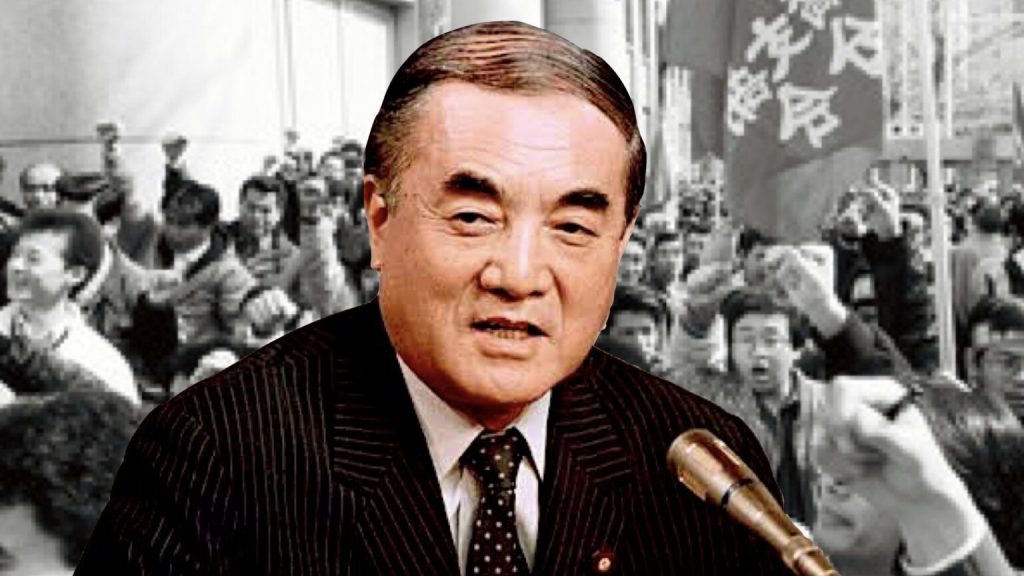
SNA (Tokyo) — When did poverty become normal? Conventional wisdom had it that poverty didn’t exist in Japan; that the miracle recovery during the country’s rapid growth period had given birth to a middle class of 100 million people.

SNA (Tokyo) — When did poverty become normal? Conventional wisdom had it that poverty didn’t exist in Japan; that the miracle recovery during the country’s rapid growth period had given birth to a middle class of 100 million people.
中曽根康弘元首相が2019年11月29日、101歳で亡くなった。1971年生まれの筆者にとって、中曽根氏は良くも悪くも鮮明に記憶に残る総理大臣の一人である。日本の戦後の総理大臣は概して「調整役」的存在に徹し、カリスマ性が求められてこなかったなか、中曽根氏はもしかしたら、初めてカリスマを志向した総理大臣だったかもしれない。“ロン・ヤス関係”と呼ばれた、アメリカのレーガン元大統領との“日米蜜月関係”の構築は、日本の「対米従属化」をいっそう加速させたといえるかもしれない。だが、当時中学生~高校生の子どもだった筆者の目には、初めて日本の首相が、アメリカと“対等に”そして“フレンドリーに”交渉する姿を見た気がした。それは単純に、彼の身長が178センチとこれまでの総理大臣の中では群を抜いて高く、アメリカ大統領と並んだときに引けをとらなかったという視覚的な印象もあるだろう。

SNA (Tokyo) — Prime Minister Yasuhiro Nakasone died this past November 29. During his tenure as prime minister from 1982 to 1987, he had deepened Japan’s subordination to the US hegemon through his Ron-Yasu Bromance with President Ronald Reagan. But to one middle and high schooler in the 1980s, he seemed to be the first prime minister to hold his own in friendly talks with the United States, almost as an equal.
Full disclosure: I am the executive president of Tokyo General Union (Tozen), and the plaintiff in this court case is a member of my union. I have a clear conflict of interest here since, although Tozen is not a direct party to the litigation, the union’s fight is key background.
So, dear reader, please read this month’s installment while keeping in mind my inevitable subjectivity on the matter.
Just last month—on October 9, 2019—the Tokyo High Court threw out a lower court ruling and voided a 2017 firing from language school Shane Corporation. The appellant, Adam Cleeve, serves as executive president of Shane Workers Union (SWU), a local chapter of Tozen. He taught English at Shane English School until the employer fired him in February 2017.
Cleeve tried to take paid leave to be with his wife during childbirth and help her care for the new baby. But Shane and Cleeve’s understandings are cleaved into two mutually exclusive understandings of how paid leave works in Japan. Shane management counted his days off as absent without leave, then refused to renew his revolving one-year contract.
He couldn’t bear the utter unjust nature of the firing (my emotion getting in the way now) and sued to overturn the dismissal in the Tokyo District Court. The lower court upheld the dismissal, however, and rejected Cleeve’s claims in a verdict that accepts the defendant’s claims, misreads the law on paid leave, ignores the plaintiff’s assertions, and errs on several facts.
Shane claimed that Cleeve had neglected a child in his class who had fallen and split her lip. He testified in detail the measures he took to care for her and inform her father. Cleeve and the union were knocked off their feet by the first ruling’s ignorance and injustice.
At this point, after two years, I would have forgiven him for giving up the fight and saying screw you to the school, the court, and the whole cruel world. But Cleeve kept the towel in his corner, stood back up, wiped off the sweat, stomped back into the ring, and dragged the case over to the appellate court. He stayed fighting because he could not accept the fact that Shane had, with impunity, violated his right to paid holiday.
He took a large corporation to court with no way to know the time or nature of the outcome, just after getting sacked, after his baby girl was born, after his wife had just given birth to that baby girl. All this required courage, determination, and tenacity, not to mention time and money.
Cleeve saw the fight as not his own but rather a fight for all his workplace comrades. He dared not let up the union’s fight to protect all workers’ right to annual paid leave. His wife and daughter were there for him, as were his union comrades who have fought alongside him for so long. Indeed, even Cleeve would have found it difficult or impossible to fight till the bitter (or sweet) end had he not had a labor union in his corner.
“This is just one small drop in the struggle for workers’ rights,” Cleeve commented on the ruling. “We owe it to each other to hold companies to account and to show solidarity with one another other.” Asked about his current situation, he said, “Now that I’m back at work, my vow is to build a union at Shane that equalizes the power between worker and employer.”
Ok, sip your morning coffee, and let’s take a look at the legal nitty gritty of this case.
Shane hires Cleeve in March 2015 on a one-year contract, which gets renewed the following March. He applies to take paid holidays for the birth of his first child due in November 2016. The company turns him down. Shane grants twenty paid holidays a year but says only five can be taken at the teacher’s discretion. The company designates the other fifteen. Cleeve takes the days anyway, and management counts him as absent without leave. Shane refuses to continue his employment after February 28, 2017.
Paid leave—called nenji yukyu kyuka, nenkyu, or yukyu—is a right guaranteed under Article 39 of the Labor Standards Act (Rokiho). This 1947 law affords you ten days after six months of employment (assuming you work five days a week), Twelve more months gives you eleven days, then the next year twelve, and so on. Each year you get a bigger tranche of yukyu till you top out at twenty days a year. You can carry each tranche over to the following year, but it’s use-them-or-lose-them after that.
One point of contention in the Shane case was over the system that designates all but five of the twenty paid holidays the school offers even in the first year. This system (called nenji yukyu kyuka keikakuteki fuyo) was legislated in 1987, ostensibly to ensure workers took paid holidays and that employers could better manage paid holidays. But use of the system requires a roshi kyotei agreement concluded between the employer and a majority employee representative.
Shane had not signed such a contract at the time of these events. The lower court evaded this issue and ruled that Cleeve’s alleged poor professionalism and multiple absences sufficed for dismissal. The High Court, however, said Shane cannot designate the legally mandated paid holidays without the roshi kyotei.
The Tokyo High Court added that Cleeve should be able to take all twenty days freely, meaning the “designated” days off were invalid. The days Cleeve did not show up for work were either legitimate paid holidays, as per the law, or days that the union struck—a right guaranteed by the Constitution of Japan. In turn, that means the non-renewal “lacked objective, rational grounds according to social norms.” That phrase represents the litigant sweet spot if you want to prove a firing needs overturning.
Among all the points addressed by the court, I was particularly impressed by its recognition of the importance of the legal principle called “procedural justice.”
The system of designating government-guaranteed paid leave days recognizes the employer’s involvement in what is supposed to be a free decision by workers. All the more reason the system must be run properly to avoid it becoming yet another tool helping management keep workers in line. A pact between management and a duly elected representative is required to designate paid holidays. Another such an agreement (called an Article 36 Agreement, saburoku kyotei, since it is stipulated there in the Labor Standards Act) is also required before workers can be asked to work more than eight hours a day. (Incidentally, workers in Japan take 51.1% of their allotted leave, according to a Ministry of Labor, Health and Welfare study. Workers are flushing half their paid leave down the drain. One of Prime Minister Shinzo Abe’s workplace reforms that kicked in this April is a new rule that forces employers to require their employees to take at least five days if they don’t take any on their own.)
This Article 36 Agreement document is crucial since it reflects the will of workers. Yet many workplace representatives are appointed by management rather than elected by employees. The representative then signs it without properly reading what she is signing. This happens at Shane as well, and our union is currently disputing just this issue in negotiations.
“Shane will do whatever they can to prevent their teachers and staff from exercising their rights under labor law—in this case, the right to take paid holidays freely,” said Tozen Senior Organizer Louis Carlet. “They make their own rules and apparently believe their rules take precedence over the law.”
Cleeve and the Shane Workers Union have drawn attention to the problem of employers ignoring workers’ voices during these processes. Although the lower court ignored this problem, the Tokyo High Court recognized that an employer cannot simply decide paid holidays unilaterally without input from the workers themselves. This verdict defends something well worth defending.
This article was written by Hifumi Okunuki, and originally published by the Shingetsu News Agency (SNA).
 Lawmaker Mio Sugita of the ruling Liberal Democratic Party found herself embroiled in controversy when the August edition of Shincho 45 was released on July 18. “Support for LGBTs has gone too far” screamed the headline of her article in the magazine.
Lawmaker Mio Sugita of the ruling Liberal Democratic Party found herself embroiled in controversy when the August edition of Shincho 45 was released on July 18. “Support for LGBTs has gone too far” screamed the headline of her article in the magazine.
This hard-right politician is already infamous online for her claim that the wartime network of sexual slavery serving the Imperial Japanese Army, euphemistically known as the “comfort women” system, is a fabrication of the Japanese left, and for attacking Koreans with such gems as “They spread their lies throughout the world.”
To mothers who lament the dearth of preschools available in Japan and demand that the central government take quick action to rectify the situation, she says: “That is your problem. You do something about it.”
She recognizes herself as conservative, right-wing and a patriot, and expresses animosity — even hatred — for the left, even penning a book titled “Why I Fight the Left.” The book heaps abuse on labor unions and praises nuclear power, casinos and the high-level professional overtime pay exemptions that will go into effect next April. Yet she loves Japan’s “beautiful culture and history.”
In her recent essay, she wrote: “Will people agree to have their taxes used on LGBT couples? They cannot have children, so they are unproductive.”
Japan does not recognize same-sex marriage. Local governments, on the other hand, have spearheaded efforts to use local ordinances to recognize same-sex partnerships. These include Shibuya and Setagaya wards in Tokyo and the cities of Iga in Mie Prefecture and Takarazuka in Hyogo.
Tolerance within society for the LGBT community is growing rapidly. IBM Japan, Kirin, Rakuten, Japan Tobacco and other corporations are moving ahead in instituting policies to provide the same level of special paid leave for marriage, childbirth, home care and other life events to same-sex couples as to those between a woman and man.
Let me introduce to you a recent verdict to give an idea of what Japan’s courts are saying about LGBT people.
A golf course in the Shizuoka city of Kosai (whose name has not been released by the courts) refused membership to a corporate executive who had changed her registered gender from male to female. In Japan, this requires you to assert that you suffer from gender dysphoria. She sued the golf course for damages due to wrongful conduct, a violation of Japan’s Civil Code.
Shizuoka District Court ruled on Sept. 8, 2014, and the Tokyo High Court handed down a verdict on July 1, 2015. Both agreed with a portion of the claims and ordered the defendant to pay the hefty sum (by Japanese jurisprudent standards) of ¥1 million.
In its verdict, the appellate court clearly condemns discrimination against LGBT, although in a way that is likely jarring (or even maddening) to some: “Society understands quite well that being LGBT is not a matter simply of a hobby or predilection, but rather an illness that they suffer regardless of their will. The intolerability of irrational treatment based on the reason of gender dysphoria or on its treatment is the same as the intolerability of irrational treatment for the reason of other illnesses.”
One thing to consider is that the golf course has a bathing area, changing rooms and other “sensitive” facilities. The high court noted that the plaintiff is physically and in terms of appearance a woman, and that when she visited three times and used the bathing area and the changing room, there were no problems. Whatever damage the golf course operator envisioned it might suffer, the court said, was “nothing more than abstract fear.”
The opinion of other members of the golf course had no effect on the verdicts. The operator surveyed its members about the issue, and some 60 percent agreed with refusing her membership. The courts investigated the survey, however, and noted that it was conducted after the suit had begun and that questioners pushed respondents to answer in a way that was advantageous to them. “The results of the survey should not be given much weight,” read the verdict.
Even if the survey had accurately reflected the opinion of the members, the courts ruled that customers’ opinions could not justify discrimination.
OK, let’s turn now to a proper labor law verdict. But to do that, we’ll have to go back a way, to 2002.
The plaintiff, a transgender woman, was working at Company S. She had yet to undergo reassignment surgery, but she had been diagnosed with gender dysphoria and had begun treatment. Although she hadn’t yet changed her registered gender, she had changed her name to a more stereotypically female one and wore women’s clothes to work.
Company S dismissed her for violating their dress code. She sued for reinstatement, back wages and bonus. Tokyo District Court ruled in her favor and overturned the dismissal.
The court ruled that the employer could not prohibit an employee from dressing as a woman at work, or transfer her for doing so, if she would suffer great emotional stress by not dressing as such due to gender dysphoria. The employer also could not do so just because clients and customers object or feel uncomfortable, provided those feelings do not rise to the level that threaten to seriously hinder the fulfillment of tasks at work.
Case law remains sparse, but it seems that if LGBT people really want to take their grievances to court, the courts believe that employers must take the proper treatment of the LGBT community seriously.
LGBT people account for 7.6 percent of the Japanese population, according to a 2015 survey by Dentsu Diversity Lab. This estimate means that 1 in 13 Japanese are lesbian, gay, bisexual or transgender. That means that any reasonably sized workplace is likely to have at least one LGBT member.
Sugita ‘s comment really irritates me. I cannot understand how a politician, or even a member of our society, can stand there and deny the existence of someone because they cannot procreate.
The defendant in the appalling massacre on July 26, 2016, of 19 severely disabled people in Sagamihara, Kanagawa Prefecture, said: “Those who can do nothing for themselves are a bane to society. On behalf of society, I did only what everyone else is thinking anyway.” He was confident in his pure fight in the name of justice.
His rationalization has something in common with Sugita’s comment. She might plausibly object that she has not called for the murder of LGBT people, so she shouldn’t be lumped together with a self-confessed mass killer. But at root, Sugita, like the Sagamihara suspect, denigrates and negates the existence of the “useless” human beings of the world.
Sugita has a daughter. What if she someday comes out to her mother? “I didn’t raise my daughter to be unproductive,” we can imagine her huffing.
Must our society be so rigid and conformist? Sugita claims she loves Japan’s history and culture more than any other politician, so she should know and be proud of the fact that ancient Japan was a hotbed of all manner of hugger-mugger and promiscuity — much of which was not at all “productive” in Sugita’s bizarre sense of the word.
Hifumi Okunuki teaches at Sagami Women’s University and serves as executive president of Tozen Union. She can be reached at tozen.okunuki@gmail.com. Labor Pains appears in print on the last Monday of the month. Your comments and Community story ideas: community@japantimes.co.jp
The number of foreign nationals working in Japan reached its highest-ever level in October 2017 at 1,278,670, according to a study by the labor ministry (bit.ly/mhlwhoudou). The foreign proportion of the population remains tiny compared to that in European countries or North America, yet the impact of the growing ranks of foreign workers is considerable in Japan, where the myth of ethnic homogeneity stubbornly persists (despite the existence of minorities, such as the Ainu and Okinawan people). What is this impact?
Well, that depends on the type of citizen being impacted upon. Let’s divide the citizenry into three broad categories based on their basic attitude toward foreign residents in general.
CONTRIBUTING WRITER
On paper, mothers and fathers are entitled to take child care leave (ikuji kyūka) at the same time for up to a year and receive two-thirds salary for the first six months and half salary for the second six months. However, eligibility depends on having worked for your current employer at least a year and expecting to be employed a year later.
The Equal Employment Opportunity Act (EEOA) had been enacted three years earlier, but awareness of issues affecting women in the workplace was still low in Japan; they were considered “workplace flowers,” “seat warmers until marriage,” “male workers’ assistants” or even “unsold Christmas cakes.” The last epithet referred to those whose values as women were said to be plunging because they had not married by age 25 (with Christmas Day being Dec. 25 and all).

By Louis Carlet (Hifumi Okunuki is off this month):
My colleague Gaetan and I recently presented a seminar on the “five-year rule” to a group of Francophones at an event hosted by the Francais du Monde — Association Democratique des Francais a l’Etranger (French of the World — Democratic Association of French Abroad).
Gaetan had prepared an organized lecture, with charts and translations projected onto the wall behind him. We worked to convince the attendees that next year they could use the so-called five-year rule to become permanent employees if they had served more than five years in fixed-term contracts. Many of them were university teachers.

Mid-April 2009. Tokyo.
Teaching English part-time at Berlitz Japan. Teaching English writing part-time at NHK Bilingual Center. Translating freelance for NHK. Translating part-time at the Agency for Cultural Affairs. Executive president of Berlitz General Union Tokyo (Begunto). Working part-time as a union organizer at the National Union of General Workers. Covering for a hospitalized full-time organizer at the same union. Working as an intern at Solidarity Network with Migrants Japan (Ijuren) in the hope of getting hired there.
The above is a list of jobs, both paid and unpaid, that my activist friend Catherine Campbell worked simultaneously back in mid-April 2009. How could she possibly have held down so many jobs without collapsing under the pressure?